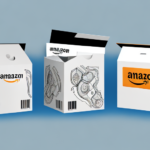Exploring Alternatives to Amazon FBA for Your Ecommerce Business
As ecommerce businesses continue to grow, choosing the right fulfillment method is becoming increasingly important. While Amazon FBA (Fulfillment by Amazon) may be the default choice for many ecommerce businesses, it is not always the most suitable option. This article explores alternative fulfillment methods for ecommerce businesses and discusses the pros and cons of each option.
Introduction: Understanding Amazon FBA and Its Limitations
Amazon FBA is a popular choice for ecommerce businesses because it offers a range of features such as storage, order processing, shipping, and customer service. However, there are limitations to using Amazon FBA that can affect businesses, including slower delivery times, limited control over the fulfillment process, and high fees.
One of the major limitations of Amazon FBA is the lack of customization options for packaging and branding. Businesses using Amazon FBA have limited control over the packaging and branding of their products, which can impact their brand image and customer experience. Additionally, Amazon FBA may not be the best option for businesses with unique or fragile products that require special handling or packaging.
Another limitation of Amazon FBA is the potential for inventory storage fees. While Amazon FBA offers storage solutions for businesses, there are fees associated with storing products in their warehouses for extended periods. This can be a significant cost for businesses with slow-moving inventory or seasonal products.
Alternative Fulfillment Methods for Ecommerce Businesses
There are several alternative fulfillment methods that ecommerce businesses can consider:
Fulfillment by Merchant (FBM)
Fulfillment by Merchant (FBM) is a fulfillment method where the seller handles all aspects of the fulfillment process, including storage, packaging, shipping, and customer service. While this method offers greater control and flexibility over the fulfillment process, it can be time-consuming and resource-intensive.
Fulfillment by Third-Party Logistics (3PL) Providers
Third-party logistics (3PL) providers are companies that offer fulfillment services to businesses. These companies handle all aspects of the fulfillment process, including storage, packaging, shipping, and customer service. While 3PL providers offer a range of benefits such as scalability, cost savings, and expertise, businesses need to choose the right provider to ensure a successful partnership.
Multichannel Fulfillment Services
Multichannel fulfillment services allow businesses to fulfill orders from multiple sales channels using a single provider. This method offers several benefits, including reduced costs, streamlined processes, and increased visibility.
Niche Ecommerce Platforms
Niche ecommerce platforms are online marketplaces that cater to specific industries or product categories. These platforms often offer dedicated seller support and in-house fulfillment services, making it easier for businesses to sell in a specialized market.
Another alternative fulfillment method that ecommerce businesses can consider is dropshipping. Dropshipping is a fulfillment method where the seller does not hold inventory but instead has the supplier ship the product directly to the customer. This method eliminates the need for storage and packaging, but it also means that the seller has less control over the fulfillment process and may have to rely on the supplier's inventory and shipping capabilities.
Finally, businesses can also consider self-fulfillment, where they handle all aspects of the fulfillment process in-house. This method offers complete control over the fulfillment process, but it can be resource-intensive and may require significant investment in storage, packaging, and shipping infrastructure.
Fulfillment by Merchant (FBM) vs. Fulfillment by Amazon (FBA)
When comparing FBM vs. FBA, the main difference is who is responsible for fulfilling the order. With FBM, the seller handles all fulfillment aspects, whereas with FBA, Amazon handles them. While FBA offers greater convenience, scalability, and customer trust, FBM provides greater control and customization over the fulfillment process.
Another advantage of FBM is that it allows sellers to save on storage fees. With FBA, sellers are required to store their products in Amazon's warehouses, which can be costly. FBM, on the other hand, allows sellers to store their products in their own facilities, which can be more cost-effective for smaller businesses.
However, FBM also comes with its own set of challenges. For example, sellers are responsible for handling all customer service inquiries and returns, which can be time-consuming and require additional resources. Additionally, FBM sellers may not be eligible for certain Amazon programs and promotions that are only available to FBA sellers.
Pros and Cons of Using Amazon FBA for Your Business
Before choosing a fulfillment method, it's important to consider the pros and cons of using Amazon FBA for your business.
Pros:
- Convenient and easy to use
- Scalable and flexible
- Access to Amazon's massive customer base
- 24/7 customer support
Cons:
- High fees and long-term storage costs
- Limited control over the fulfillment process
- Slower delivery times compared to other options
- Competition with other Amazon sellers
Another important factor to consider when using Amazon FBA is the potential impact on your brand's reputation. While Amazon provides excellent customer service, they may not always handle your products with the same care and attention to detail as you would. This can lead to negative reviews and feedback from customers, which can ultimately harm your business. It's important to weigh the benefits of using Amazon FBA against the potential risks to your brand's reputation.
Cost Comparison: Amazon FBA vs. Other Fulfillment Options
Cost is a crucial factor when choosing a fulfillment method. While Amazon FBA fees are based on various factors such as product size, weight, and storage duration, other fulfillment options offer competitive rates and potential cost savings.
One alternative to Amazon FBA is using a third-party logistics (3PL) provider. 3PLs can offer customized solutions for your business needs, such as specialized packaging or shipping options. Additionally, some 3PLs offer discounted shipping rates due to their volume of shipments.
Another option is to fulfill orders in-house. While this may require more resources and time, it can be a cost-effective solution for small businesses with low order volumes. By purchasing shipping materials in bulk and negotiating rates with carriers, businesses can save on fulfillment costs.
According to a 2023 Forbes report, businesses that optimize their fulfillment strategies can reduce costs by up to 20% while improving delivery times.
Benefits of Using Third-Party Logistics (3PL) Providers for Ecommerce Fulfillment
Using third-party logistics (3PL) providers for ecommerce fulfillment offers several advantages, such as:
- Reduced shipping costs
- Scalability and flexibility
- Expertise and guidance
- Streamlined processes
In addition to these benefits, using a 3PL provider can help ecommerce businesses expand their reach and customer base. With a 3PL provider, businesses can easily store and ship their products to customers in different regions or even countries, without worrying about the logistics of international shipping. This can help businesses tap into new markets and increase their sales revenue.
How to Choose the Right 3PL Provider for Your Business
When choosing a 3PL provider, businesses need to consider factors such as:
- Experience and expertise
- Cost and pricing structure
- Service-level agreements (SLAs)
- Technology and software integrations
- Customer service and support
Another important factor is the provider's geographic reach. If your business operates globally, you need a provider that can handle international shipping and customs regulations. Conversely, if your business operates locally, you may want to choose a provider with a strong presence in your region to ensure faster and more efficient deliveries.
It's also crucial to consider the scalability of the 3PL provider. As your business grows, your logistics needs will change. Choose a provider that can adapt to your evolving requirements and offer flexible solutions. Ensure they have the capacity to handle increased volumes and can integrate seamlessly with your existing systems.
Leveraging Multichannel Fulfillment Services to Expand Your Reach
By leveraging multichannel fulfillment services, businesses can expand their reach and sell on multiple sales channels such as Amazon, eBay, and their own websites. This method offers several benefits, including:
- Reduced costs and streamlined processes
- Increased visibility and market reach
- Access to a wider customer base
- Flexible and scalable options
Moreover, multichannel fulfillment services allow businesses to manage their inventory and orders from a single platform. This ensures accurate tracking of inventory levels and sales across all channels, enabling informed decisions about stock levels and pricing strategies. Additionally, multichannel fulfillment services often provide advanced analytics and reporting tools, which can help businesses identify trends and opportunities for growth.
Exploring Niche Ecommerce Platforms and Their Fulfillment Options
Niche ecommerce platforms offer businesses the opportunity to sell in specialized markets such as luxury fashion, handmade goods, and vintage items. These platforms often provide dedicated seller support and in-house fulfillment services, making it easier for businesses to operate in a specific market.
One of the benefits of using niche ecommerce platforms is the ability to reach a highly targeted audience. For example, if a business sells handmade jewelry, they can list their products on a platform that caters specifically to handmade goods. This increases the likelihood of their products being seen by customers interested in that particular niche.
Another advantage is the potential for lower competition. While larger ecommerce platforms like Amazon and eBay have millions of sellers, niche platforms may have fewer sellers in a specific market. This can make it easier for businesses to stand out and gain traction in their niche.
Case Study: Successful Implementation of Alternative Fulfillment Methods in Ecommerce Business
There are many success stories of ecommerce businesses that have implemented alternative fulfillment methods to streamline processes, reduce costs, and improve customer satisfaction. By researching the best fit for your business, you too can transition to an alternative fulfillment method and achieve success.
One example is an online clothing retailer that switched from traditional warehousing to a dropshipping model. By partnering with multiple suppliers, the retailer was able to offer a wider range of products without the need for additional storage space. This resulted in a significant reduction in overhead costs and an increase in profit margins.
Another example is a home goods retailer that implemented a ship-from-store model. By utilizing inventory from their physical stores, the retailer fulfilled online orders more quickly and efficiently. This not only improved customer satisfaction but also reduced shipping costs and increased sales.
Conclusion: Finding the Best Ecommerce Fulfillment Solution for Your Business
When it comes to ecommerce fulfillment, there is no one-size-fits-all solution. By carefully considering your business needs and researching the different options available, you can choose a fulfillment method that offers the right balance of control, cost, and convenience.
One important factor to consider is the location of your customers. If you have a large customer base in a specific region, it may be more cost-effective to use a fulfillment center located in that area. This can reduce shipping costs and delivery times, leading to increased customer satisfaction and loyalty.
Another consideration is the level of customization and branding you want for your packaging and shipping materials. Some fulfillment providers offer more options for custom packaging, while others may have more limited options. If branding and presentation are important to your business, it's essential to choose a provider that can meet your specific needs.
For more insights and data on ecommerce fulfillment trends, refer to authoritative sources such as the Statista report on ecommerce fulfillment and the latest industry reports.






















